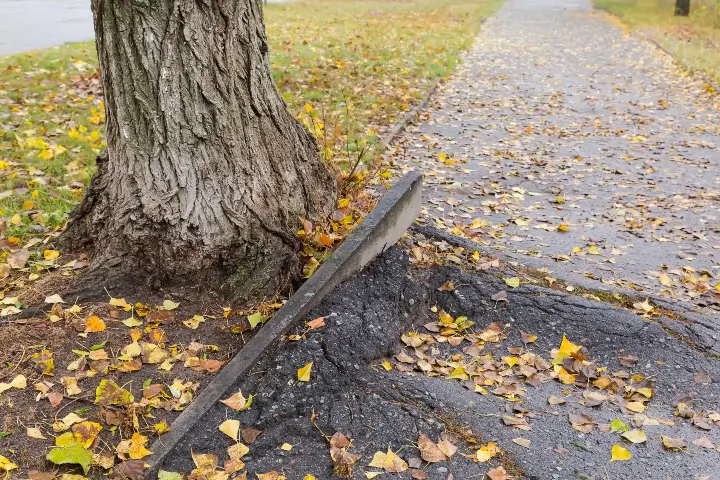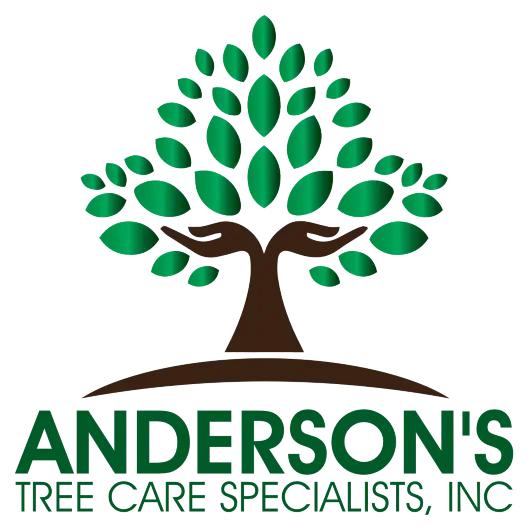
When you look at a tree, you only see what’s going on above the surface, when in actuality, there’s so much going on below the surface. An underground network of tree roots can be as expansive as the tree itself, and these intricate root systems play a vital role in providing a tree’s stability and nourishment. If there’s a problem with the tree root system, it can quickly become an issue for the entire tree.
So, what are some common tree root problems and what can you do about them? In this article, we’ll talk about problems with tree roots, tree root collars, and how they affect trees.
What are the Signs of Tree Root Problems?
If there’s a problem with your tree roots, the signs can manifest in your tree in many ways. Early intervention can prevent worsening issues. The root collar of a tree is of the utmost importance for a healthy root system. It plays a crucial role in maintaining the tree’s structural integrity.
Recognizing the signs of these disorders is essential for early detection and effective intervention. Common signs of tree root disorders include:
- Yellowing Foliage: When the root area is compromised, it can lead to a reduction in the tree’s ability to take up water and nutrients. As a result, the leaves may exhibit symptoms such as yellowing and wilting.
- Premature Leaf Color Change and Shedding: The premature shedding and color change of a tree’s leaves is a possible indicator of a root disorder.
- Cankers or Lesions: Cankers and lesions are areas of dead or diseased tissue on the trunk near the root collar. They often appear as sunken, discolored, or oozing spots.
- Dieback in the Upper Canopy: Dieback in the upper canopy of a tree is a condition where the uppermost branches will exhibit sparse or thin foliage. Leaves may be smaller, discolored, or wilted.
- Leaning or Tilting: The leaning or tilting of a tree, especially if mature, can be caused by root disorders.
Need a Tree and Plant Healthcare Estimate?
Click below to leave your information and we will call you right back!
Ready to schedule your tree & plant care service?
Leave your information below and we will give you a call back.
*During normal business hours. After hours calls will be returned the next business day.
What Does a Healthy Root Collar Look Like?
When you picture that characteristic flare at the base of a tree where the trunk transitions into roots, that’s the root collar. This flare should be visible above the soil line and should not be buried or obscured. A root collar indicates that the roots are spreading out and supporting the tree’s stability.
Healthy root collars typically don’t have exposed or visible roots above the soil surface. The roots are securely anchored below the soil line, with the root collar forming a natural, smooth junction between the trunk and the root system. It should not show any signs of decay, rot, or fungal growth.
How Does Root Collar Treatment Work?
Root collar treatment is a tailored approach that focuses on addressing the specific issues impacting the tree’s root collar and overall well-being. Consulting with a professional arborist at Anderson’s Tree Care Specialists is crucial to ensure the most effective and appropriate treatment for your tree’s needs.
These treatments depend on the type of root collar disorder but may include root pruning to alleviate pressure from girdling roots, disease, and pest management to combat root infections, and soil improvement measures to create a healthier root environment. Our expertise enables us to diagnose the issue accurately and implement the most effective and tailored treatment to restore the tree’s health, structural integrity, and overall vitality.
San Jose Area Tree Root Care with Anderson’s Tree Care Specialists
Quickly addressing root collar problems can safeguard a tree’s health when immediate action is taken. The experienced arborists at Anderson’s Tree Care Specialists have 28 years of tree care and maintenance experience. Trust in our knowledge to protect your trees while upholding the beauty of your landscaping.
We offer expert tree services and year-round maintenance solutions. Reach out to us today to learn more.
Back to Tree and Plant HealthcareCommon Tree Root Problems in the San Jose Metro Area
Serving San Jose CA
San Jose | Fremont | Newark (CA) | Milpitas | Mountain View | Stanford | Palo Alto | East Palo Alto | Woodside | San Mateo | San Carlos
Redwood City | Los Gatos | Saratoga | Cupertino | Fruitdale | Campbell | Alamitos | Santa Clara | Coyote | Morgan Hill | San Martin | Gilroy
Home » Tree and Plant Healthcare » Common Tree Root Problems



